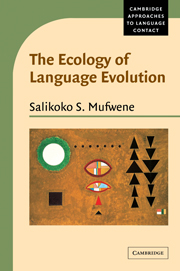Book contents
- Frontmatter
- Contents
- List of illustrations
- Preface
- Acknowledgments
- 1 Introduction
- 2 The Founder Principle in the development of creoles
- 3 The development of American Englishes: factoring contact in and the social bias out
- 4 The legitimate and illegitimate offspring of English
- 5 What research on the development of creoles can contribute to genetic linguistics
- 6 Language contact, evolution, and death: how ecology rolls the dice
- 7 Past and recent population movements in Africa: their impact on its linguistic landscape
- 8 Conclusions: the big picture
- Notes
- References
- Author index
- Subject index
3 - The development of American Englishes: factoring contact in and the social bias out
Published online by Cambridge University Press: 18 December 2009
- Frontmatter
- Contents
- List of illustrations
- Preface
- Acknowledgments
- 1 Introduction
- 2 The Founder Principle in the development of creoles
- 3 The development of American Englishes: factoring contact in and the social bias out
- 4 The legitimate and illegitimate offspring of English
- 5 What research on the development of creoles can contribute to genetic linguistics
- 6 Language contact, evolution, and death: how ecology rolls the dice
- 7 Past and recent population movements in Africa: their impact on its linguistic landscape
- 8 Conclusions: the big picture
- Notes
- References
- Author index
- Subject index
Summary
In this chapter I take up some of the positions and issues not elaborated in chapter 2, especially the assumption that koinéization played a role in the development of White American English vernaculars (WAEV). I maintain that they are contact-based and developed by the same restructuring processes which produced the vernaculars called creoles. The myth that WAEVs have been inherited almost intact from England, whereas African-American English (AAE) varieties represent their corruption by contact with African languages cannot remain unchallenged. The fact that no single WAEV is a match of any British English vernacular, although many of their features can individually be matched across both sides of the Atlantic, deserves an explanation. Part of the explanation lies in the competition-and-selection process submitted in chapters 1 and 2. Contact of dialects and of languages was as much a factor in the development of WAEVs as of AAE.
Introduction
This chapter is largely programmatic. I primarily intend to be provocative and invite readers to re-examine several poorly justified assumptions about the status and origin of American English varieties. I do not provide (conclusive) answers to several questions I raise, although I suggest new research avenues. The term American English is pluralized in the title, on the model of the more common term new Englishes, simply to emphasize diversity over the typically suggested uniformity in the anglophone linguistic universe of the USA. Thus I expect to be consistent with research in American dialectology.
Information
- Type
- Chapter
- Information
- The Ecology of Language Evolution , pp. 81 - 105Publisher: Cambridge University PressPrint publication year: 2001
Accessibility standard: Unknown
Why this information is here
This section outlines the accessibility features of this content - including support for screen readers, full keyboard navigation and high-contrast display options. This may not be relevant for you.Accessibility Information
- 1
- Cited by
